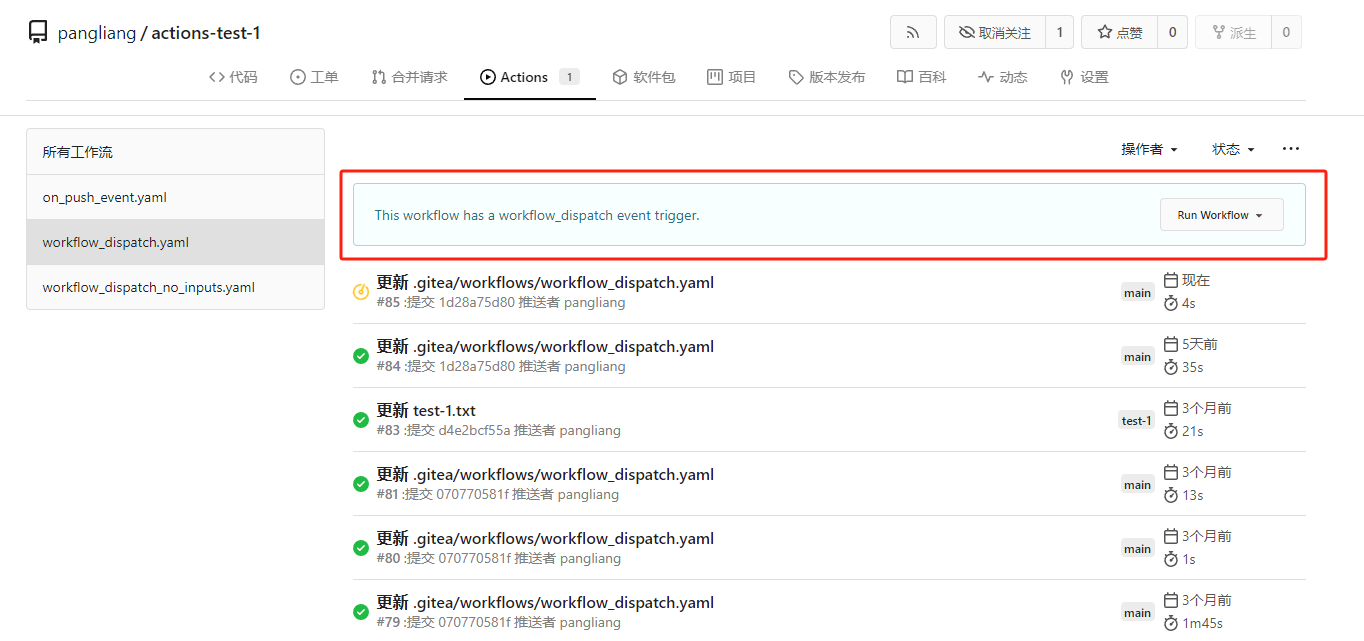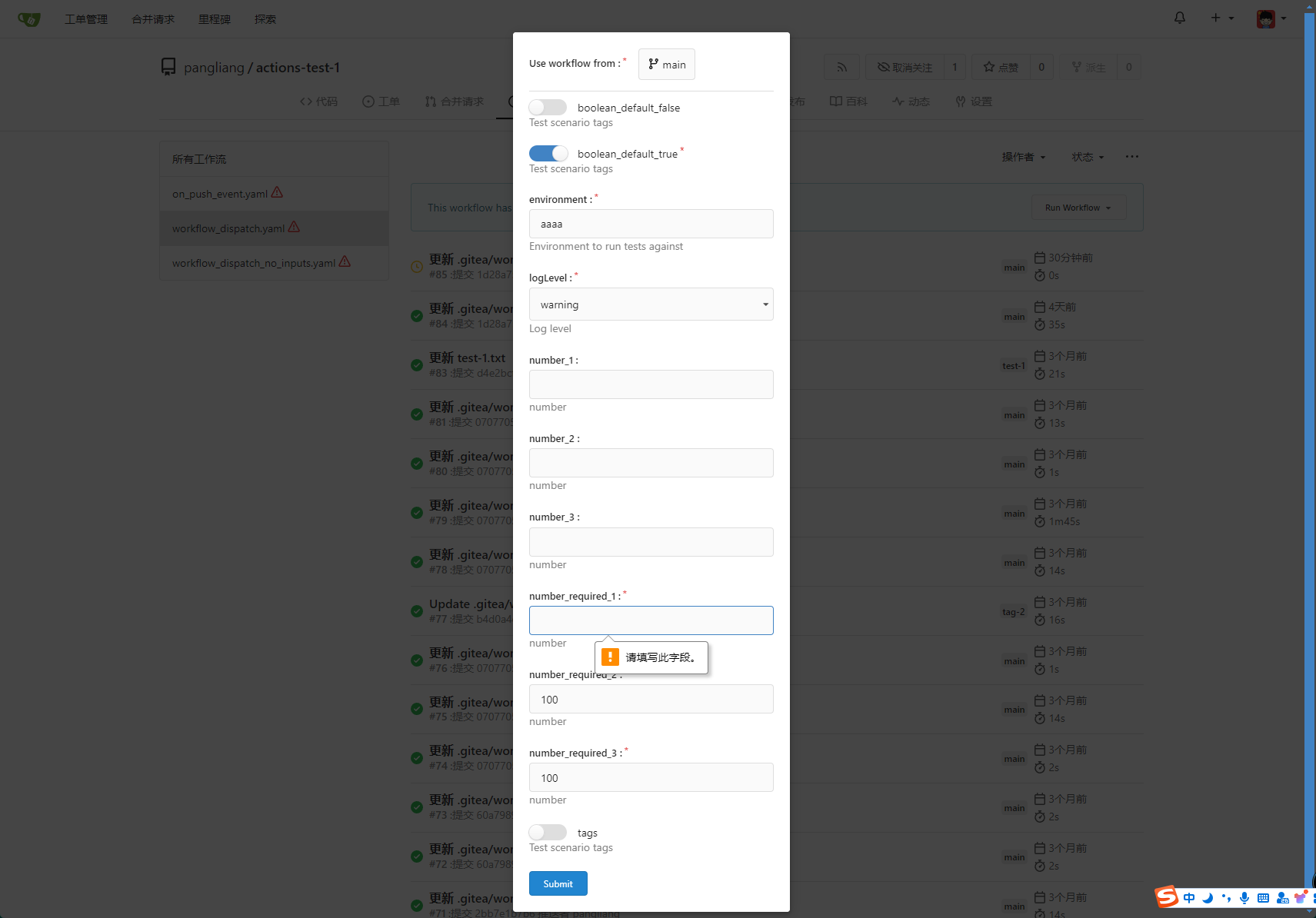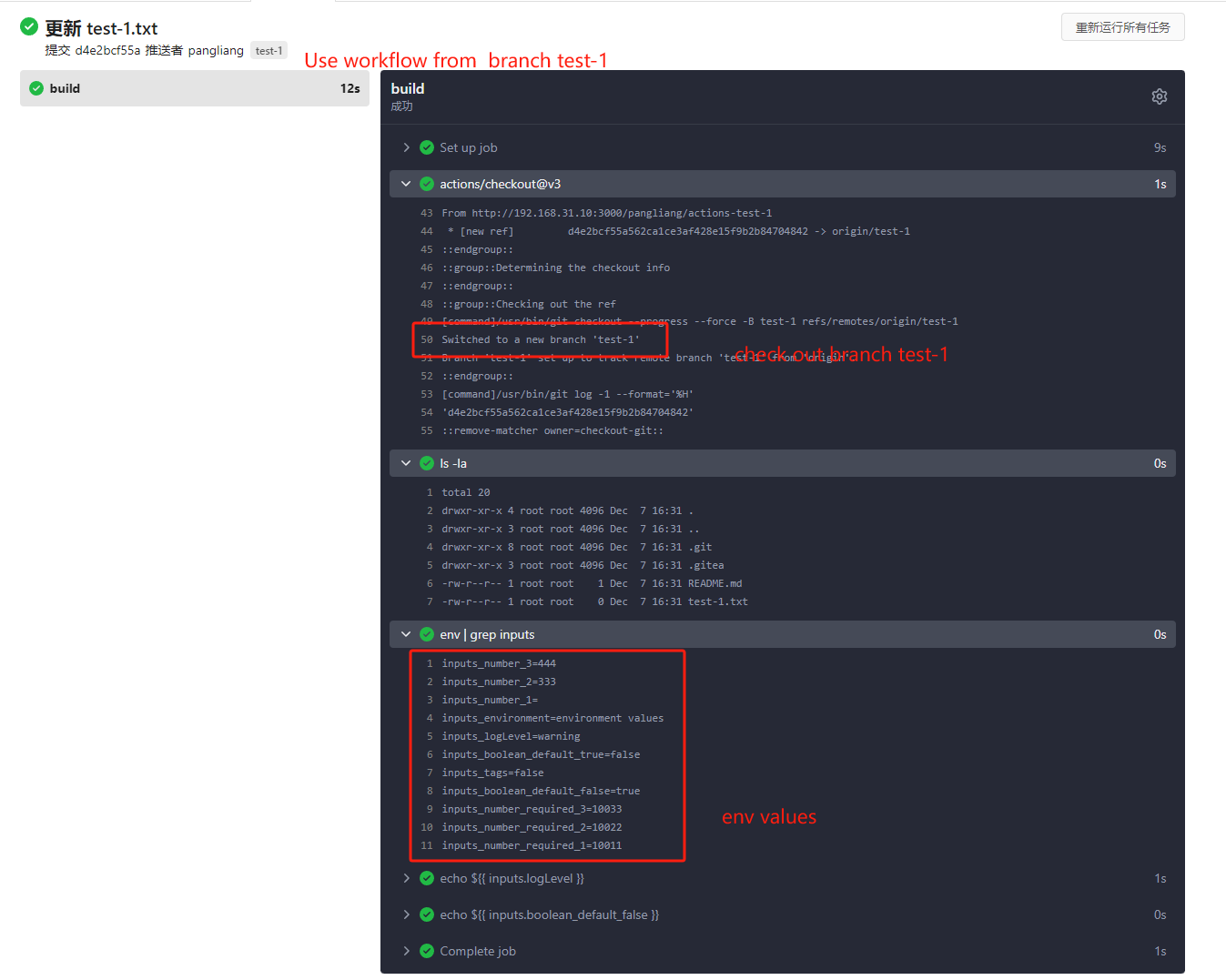- When pasting a URL over another URL, replace the URL instead of
creating a useless `[url](url)`. This is the 1-line change
[here](https://github.com/go-gitea/gitea/pull/31948/files#diff-be8e94d7e3da33b187381f53d28095107bd0cf29ae9a9e997e4f422f4a54479cR122).
- Always run `initTextareaEvents`, previously it was not run when
`dropzoneEl` was not present like when attachements are disabled on the
server. Refactored the function to gracefully handle absent `dropzoneEl`
and rename the function to a better name.
Follow #31908. The main refactor is that it has removed the returned
context of `Lock`.
The returned context of `Lock` in old code is to provide a way to let
callers know that they have lost the lock. But in most cases, callers
shouldn't cancel what they are doing even it has lost the lock. And the
design would confuse developers and make them use it incorrectly.
See the discussion history:
https://github.com/go-gitea/gitea/pull/31813#discussion_r1732041513 and
https://github.com/go-gitea/gitea/pull/31813#discussion_r1734078998
It's a breaking change, but since the new module hasn't been used yet, I
think it's OK to not add the `pr/breaking` label.
## Design principles
It's almost copied from #31908, but with some changes.
### Use spinlock even in memory implementation (unchanged)
In actual use cases, users may cancel requests. `sync.Mutex` will block
the goroutine until the lock is acquired even if the request is
canceled. And the spinlock is more suitable for this scenario since it's
possible to give up the lock acquisition.
Although the spinlock consumes more CPU resources, I think it's
acceptable in most cases.
### Do not expose the mutex to callers (unchanged)
If we expose the mutex to callers, it's possible for callers to reuse
the mutex, which causes more complexity.
For example:
```go
lock := GetLocker(key)
lock.Lock()
// ...
// even if the lock is unlocked, we cannot GC the lock,
// since the caller may still use it again.
lock.Unlock()
lock.Lock()
// ...
lock.Unlock()
// callers have to GC the lock manually.
RemoveLocker(key)
```
That's why
https://github.com/go-gitea/gitea/pull/31813#discussion_r1721200549
In this PR, we only expose `ReleaseFunc` to callers. So callers just
need to call `ReleaseFunc` to release the lock, and do not need to care
about the lock's lifecycle.
```go
release, err := locker.Lock(ctx, key)
if err != nil {
return err
}
// ...
release()
// if callers want to lock again, they have to re-acquire the lock.
release, err := locker.Lock(ctx, key)
// ...
```
In this way, it's also much easier for redis implementation to extend
the mutex automatically, so that callers do not need to care about the
lock's lifecycle. See also
https://github.com/go-gitea/gitea/pull/31813#discussion_r1722659743
### Use "release" instead of "unlock" (unchanged)
For "unlock", it has the meaning of "unlock an acquired lock". So it's
not acceptable to call "unlock" when failed to acquire the lock, or call
"unlock" multiple times. It causes more complexity for callers to decide
whether to call "unlock" or not.
So we use "release" instead of "unlock" to make it clear. Whether the
lock is acquired or not, callers can always call "release", and it's
also safe to call "release" multiple times.
But the code DO NOT expect callers to not call "release" after acquiring
the lock. If callers forget to call "release", it will cause resource
leak. That's why it's always safe to call "release" without extra
checks: to avoid callers to forget to call it.
### Acquired locks could be lost, but the callers shouldn't stop
Unlike `sync.Mutex` which will be locked forever once acquired until
calling `Unlock`, for distributed lock, the acquired lock could be lost.
For example, the caller has acquired the lock, and it holds the lock for
a long time since auto-extending is working for redis. However, it lost
the connection to the redis server, and it's impossible to extend the
lock anymore.
In #31908, it will cancel the context to make the operation stop, but
it's not safe. Many operations are not revert-able. If they have been
interrupted, then the instance goes corrupted. So `Lock` won't return
`ctx` anymore in this PR.
### Multiple ways to use the lock
1. Regular way
```go
release, err := Lock(ctx, key)
if err != nil {
return err
}
defer release()
// ...
```
2. Early release
```go
release, err := Lock(ctx, key)
if err != nil {
return err
}
defer release()
// ...
// release the lock earlier
release()
// continue to do something else
// ...
```
3. Functional way
```go
if err := LockAndDo(ctx, key, func(ctx context.Context) error {
// ...
return nil
}); err != nil {
return err
}
```
To help #31813, but do not replace it, since this PR just introduces the
new module but misses some work:
- New option in settings. `#31813` has done it.
- Use the locks in business logic. `#31813` has done it.
So I think the most efficient way is to merge this PR first (if it's
acceptable) and then finish #31813.
## Design principles
### Use spinlock even in memory implementation
In actual use cases, users may cancel requests. `sync.Mutex` will block
the goroutine until the lock is acquired even if the request is
canceled. And the spinlock is more suitable for this scenario since it's
possible to give up the lock acquisition.
Although the spinlock consumes more CPU resources, I think it's
acceptable in most cases.
### Do not expose the mutex to callers
If we expose the mutex to callers, it's possible for callers to reuse
the mutex, which causes more complexity.
For example:
```go
lock := GetLocker(key)
lock.Lock()
// ...
// even if the lock is unlocked, we cannot GC the lock,
// since the caller may still use it again.
lock.Unlock()
lock.Lock()
// ...
lock.Unlock()
// callers have to GC the lock manually.
RemoveLocker(key)
```
That's why
https://github.com/go-gitea/gitea/pull/31813#discussion_r1721200549
In this PR, we only expose `ReleaseFunc` to callers. So callers just
need to call `ReleaseFunc` to release the lock, and do not need to care
about the lock's lifecycle.
```go
_, release, err := locker.Lock(ctx, key)
if err != nil {
return err
}
// ...
release()
// if callers want to lock again, they have to re-acquire the lock.
_, release, err := locker.Lock(ctx, key)
// ...
```
In this way, it's also much easier for redis implementation to extend
the mutex automatically, so that callers do not need to care about the
lock's lifecycle. See also
https://github.com/go-gitea/gitea/pull/31813#discussion_r1722659743
### Use "release" instead of "unlock"
For "unlock", it has the meaning of "unlock an acquired lock". So it's
not acceptable to call "unlock" when failed to acquire the lock, or call
"unlock" multiple times. It causes more complexity for callers to decide
whether to call "unlock" or not.
So we use "release" instead of "unlock" to make it clear. Whether the
lock is acquired or not, callers can always call "release", and it's
also safe to call "release" multiple times.
But the code DO NOT expect callers to not call "release" after acquiring
the lock. If callers forget to call "release", it will cause resource
leak. That's why it's always safe to call "release" without extra
checks: to avoid callers to forget to call it.
### Acquired locks could be lost
Unlike `sync.Mutex` which will be locked forever once acquired until
calling `Unlock`, in the new module, the acquired lock could be lost.
For example, the caller has acquired the lock, and it holds the lock for
a long time since auto-extending is working for redis. However, it lost
the connection to the redis server, and it's impossible to extend the
lock anymore.
If the caller don't stop what it's doing, another instance which can
connect to the redis server could acquire the lock, and do the same
thing, which could cause data inconsistency.
So the caller should know what happened, the solution is to return a new
context which will be canceled if the lock is lost or released:
```go
ctx, release, err := locker.Lock(ctx, key)
if err != nil {
return err
}
defer release()
// ...
DoSomething(ctx)
// the lock is lost now, then ctx has been canceled.
// Failed, since ctx has been canceled.
DoSomethingElse(ctx)
```
### Multiple ways to use the lock
1. Regular way
```go
ctx, release, err := Lock(ctx, key)
if err != nil {
return err
}
defer release()
// ...
```
2. Early release
```go
ctx, release, err := Lock(ctx, key)
if err != nil {
return err
}
defer release()
// ...
// release the lock earlier and reset the context back
ctx = release()
// continue to do something else
// ...
```
3. Functional way
```go
if err := LockAndDo(ctx, key, func(ctx context.Context) error {
// ...
return nil
}); err != nil {
return err
}
```
Update mermaid to
[v11](https://github.com/mermaid-js/mermaid/releases/tag/v11.0.0) and
enable the new [`suppressErrorRendering`
option](https://github.com/mermaid-js/mermaid/pull/4359) to ensure
mermaid never renders error elements into the DOM (we have per-chart
error rendering, so don't need it). Tested various chart types.
BTW, I was unable to reproduce that error rendering from mermaid with
`suppressErrorRendering: false` and I thought we had some CSS to hide
the error element, but I could not find it, not even in git history.
This Pull Request adds missing tool tips for the protected, copy, and rss icons on the branch list page. It also moved protected icon position after the branch name.
When opening a repository, it will call `ensureValidRepository` and also
`CatFileBatch`. But sometimes these will not be used until repository
closed. So it's a waste of CPU to invoke 3 times git command for every
open repository.
This PR removed all of these from `OpenRepository` but only kept
checking whether the folder exists. When a batch is necessary, the
necessary functions will be invoked.
In the OpenID flows, the "CfTurnstileSitekey" wasn't populated, which
caused those flows to fail if using Turnstile as the Captcha
implementation.
This adds the missing context variables, allowing Turnstile to be used
in the OpenID flows.
fix#23668
My plan:
* In the `actions.list` method, if workflow is selected and IsAdmin,
check whether the on event contains `workflow_dispatch`. If so, display
a `Run workflow` button to allow the user to manually trigger the run.
* Providing a form that allows users to select target brach or tag, and
these parameters can be configured in yaml
* Simple form validation, `required` input cannot be empty
* Add a route `/actions/run`, and an `actions.Run` method to handle
* Add `WorkflowDispatchPayload` struct to pass the Webhook event payload
to the runner when triggered, this payload carries the `inputs` values
and other fields, doc: [workflow_dispatch
payload](https://docs.github.com/en/webhooks/webhook-events-and-payloads#workflow_dispatch)
Other PRs
* the `Workflow.WorkflowDispatchConfig()` method still return non-nil
when workflow_dispatch is not defined. I submitted a PR
https://gitea.com/gitea/act/pulls/85 to fix it. Still waiting for them
to process.
Behavior should be same with github, but may cause confusion. Here's a
quick reminder.
*
[Doc](https://docs.github.com/en/actions/using-workflows/events-that-trigger-workflows#workflow_dispatch)
Said: This event will `only` trigger a workflow run if the workflow file
is `on the default branch`.
* If the workflow yaml file only exists in a non-default branch, it
cannot be triggered. (It will not even show up in the workflow list)
* If the same workflow yaml file exists in each branch at the same time,
the version of the default branch is used. Even if `Use workflow from`
selects another branch

```yaml
name: Docker Image CI
on:
workflow_dispatch:
inputs:
logLevel:
description: 'Log level'
required: true
default: 'warning'
type: choice
options:
- info
- warning
- debug
tags:
description: 'Test scenario tags'
required: false
type: boolean
boolean_default_true:
description: 'Test scenario tags'
required: true
type: boolean
default: true
boolean_default_false:
description: 'Test scenario tags'
required: false
type: boolean
default: false
environment:
description: 'Environment to run tests against'
type: environment
required: true
default: 'environment values'
number_required_1:
description: 'number '
type: number
required: true
default: '100'
number_required_2:
description: 'number'
type: number
required: true
default: '100'
number_required_3:
description: 'number'
type: number
required: true
default: '100'
number_1:
description: 'number'
type: number
required: false
number_2:
description: 'number'
type: number
required: false
number_3:
description: 'number'
type: number
required: false
env:
inputs_logLevel: ${{ inputs.logLevel }}
inputs_tags: ${{ inputs.tags }}
inputs_boolean_default_true: ${{ inputs.boolean_default_true }}
inputs_boolean_default_false: ${{ inputs.boolean_default_false }}
inputs_environment: ${{ inputs.environment }}
inputs_number_1: ${{ inputs.number_1 }}
inputs_number_2: ${{ inputs.number_2 }}
inputs_number_3: ${{ inputs.number_3 }}
inputs_number_required_1: ${{ inputs.number_required_1 }}
inputs_number_required_2: ${{ inputs.number_required_2 }}
inputs_number_required_3: ${{ inputs.number_required_3 }}
jobs:
build:
runs-on: ubuntu-latest
steps:
- uses: actions/checkout@v3
- run: ls -la
- run: env | grep inputs
- run: echo ${{ inputs.logLevel }}
- run: echo ${{ inputs.boolean_default_false }}
```


---------
Co-authored-by: TKaxv_7S <954067342@qq.com>
Co-authored-by: silverwind <me@silverwind.io>
Co-authored-by: Denys Konovalov <kontakt@denyskon.de>
Co-authored-by: Lunny Xiao <xiaolunwen@gmail.com>
When a long line with characters such as dots is returned by a step in
an action (e.g. by the output of the Ruby on Rails test runner), it
overflows the log container, causing the page to scroll sideways.
This PR adds the CSS `overflow-wrap: anywhere;` to the
`.job-step-section .job-step-logs .job-log-line .log-msg` selector,
which causes such lines to wrap as well
Fix#31625.
If `pull_service.NewPullRequest` return an error which misses each `if`
check, `CompareAndPullRequestPost` will return immediately, since it
doesn't write the HTTP response, a 200 response with empty body will be
sent to clients.
```go
if err := pull_service.NewPullRequest(ctx, repo, pullIssue, labelIDs, attachments, pullRequest, assigneeIDs); err != nil {
if repo_model.IsErrUserDoesNotHaveAccessToRepo(err) {
ctx.Error(http.StatusBadRequest, "UserDoesNotHaveAccessToRepo", err.Error())
} else if git.IsErrPushRejected(err) {
// ...
ctx.JSONError(flashError)
} else if errors.Is(err, user_model.ErrBlockedUser) {
// ...
ctx.JSONError(flashError)
} else if errors.Is(err, issues_model.ErrMustCollaborator) {
// ...
ctx.JSONError(flashError)
}
return
}
```
Not sure what kind of error can cause it to happen, so this PR just
expose it. And we can fix it when users report that creating PRs failed
with error responses.
It's all my guess since I cannot reproduce the problem, but even if it's
not related, the code here needs to be improved.
Fix#31395
This regression is introduced by #30273. To find out how GitHub handles
this case, I did [some
tests](https://github.com/go-gitea/gitea/issues/31395#issuecomment-2278929115).
I use redirect in this PR instead of checking if the corresponding `.md`
file exists when rendering the link because GitHub also uses redirect.
With this PR, there is no need to resolve the raw wiki link when
rendering a wiki page. If a wiki link points to a raw file, access will
be redirected to the raw link.
Fix#31807
ps: the newly added params's value will be changed.
When the first time you selected the filter, the values of params will
be `0` or `1`
But in pager it will be `true` or `false`.
So do we have `boolToInt` function?
Fix#31730
This PR rewrote the function `PublicKeysAreExternallyManaged` with a
simple test. The new function removed the loop to make it more readable.
We had an issue where a repo was using LFS to store a file, but the user
did not push the file. When trying to view the file, Gitea returned a
500 HTTP status code referencing `ErrLFSObjectNotExist`. It appears the
intent was the render this file as plain text, but the conditional was
flipped. I've also added a test to verify that the file is rendered as
plain text.
When transferring repositories that have issues linked to a project
board to another organization, the issues remain associated with the
original project board. This causes the columns in the project board to
become bugged, making it difficult to move other issues in or out of the
affected columns. As a solution, I removed the issue relations since the
other organization does not have this project table.
Fix for #31538
Co-authored-by: Jason Song <i@wolfogre.com>
As discussed in #31667 & #26561, when a card on a Project contains
images, they can overflow the card on its containing column. This aims
to fix this issue via snapping scrollbars.
---
Issue #31667 is open to discussion as there should be room for
improvement.